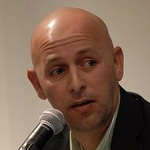This is not journalism, this is a picnic
 Laith Mushtaq, war reporter for Al Jazeera, is very clear about his opinion on embedded journalism. “Eating Burger King and drinking beer with soldiers, that is not a story.”
Laith Mushtaq, war reporter for Al Jazeera, is very clear about his opinion on embedded journalism. “Eating Burger King and drinking beer with soldiers, that is not a story.”
A room filled with journalists, who all hear what this man has to say. Some just join out of interest, others see this meeting as a preparation to go to war zones. “I want to show the ugly side of war, the reality. My goal is civilians; this is my reason to go to war.” According to Laith, we should ask ourselves why we are going there. He builds up his story, and switches from practical tips to first hand experiences, while all of it is covered with a blanket of slight irony. “If you are not ready, go and cover football games.”
It is clear that Laith Mushtaq does not consider his job as playing a game, and this is the message he is passing on to his audience. Only partial information about his life comes through during his lecture. This Iraqi lost his family because of war, and spend six years of his life as a soldier. It seems only logical for him, to do what he is doing. It seems like there is no other option than to stay in that world and try to make sense of it, to pass on this reality. But why would ‘one of us’ go there, voluntarily?
War is like an elevator, it can take you to heaven or hell
We can only imagine all the stories that Laith has to tell, but maybe it says enough when he talks about the mental aspect of being a war reporter. “You cannot format it, it is not a harddisk.” Laith is referring to the brain and how one can never forget the sight and smell that you experience. “Each time you look at a dead body, something will change inside of you. You will lose an innocent part of you.” It seems hard to ever go back to chitchatting and just enjoying a piece of nature. “What is the beauty? It means nothing to me.”
Besides the irony, you also get the feeling that his view on some journalists is not a positive one. “Some European reporters, when they go to Africa, and it’s hot, they are wearing flip-flops.” The expression on his face, and the sound of unbelief while he says: “sorry?” Not only wearing the right things, but also basics like water are often neglected. “Don’t think if you cover war only bullets will kill you.” Laith talks about having the right equipment for the right situation. Every country, war and situation is different, and the things that can save you in one place can mean a dead sentence in the following. Besides practical preparation one should show respect and understanding of other people’s mentality.
Arrest me, please, it will be my pleasure
One of his stories took place in Niger. “If they ask you to drink and go with them, don’t go. You will be the first sacrifice.” On one incident someone from the ‘gendarme’, wanted to put him in jail. “Arrest me, please, it will be my pleasure.” When asked by the guy if he is not afraid he said: “Maybe you will lock me up for one, two, maybe six months, but after that you will let me go. I will get about 25.000 dollars from my agency. I will be famous, only imagine how many newspapers will write about this.” His message is to put your fear aside, since this will only put you in bigger risk. After hearing some of the stories, the audience laughs, which seems to be ironic, since for Laith it is not a joke to say the least.
One point, your life is more important than news
“They are human beings, no different from us.” People in Iraq, people all over the world all are the same. He says that we should carry the truth, because the media can change public opinion and that in turn can change politics. “You are just a messenger. If I am home, drinking tea I can be a communist, or leftwing etc, but not with my camera. Yes, I am Iraqi and I lost my family in war, but that cannot be my standpoint.”
Nicole Jachmann
